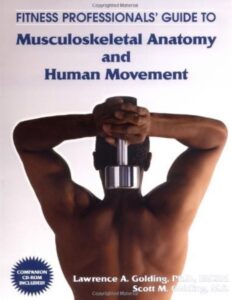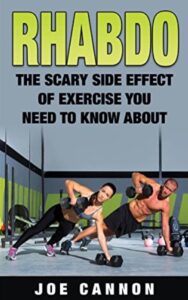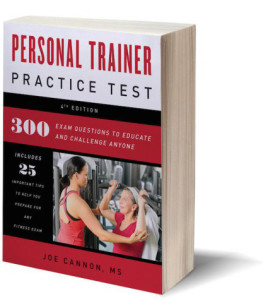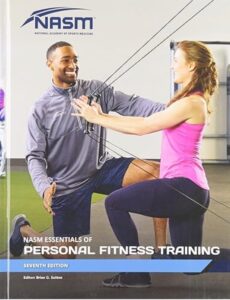
Update 9/5/20. If you have the Certified Strength and Conditioning Specialist (CSCS) credential, you know you have one of the most highly coveted fitness /certifications in the world. Several people have noticed the “CSCS” in my email signature (and license plate) and have asked me if I could give them some pointers on how to study for and pass this exam –and that’s exactly what I’m going to do now. My goal in this CSCS review is to not only tell you what I did but hopefully also give you some insights on how you can study and pass the CSCS exam. If you have any questions leave a comment below.
The NSCA is a nonprofit organization that was created in 1978. The CSCS certification was the first fitness credential offered by the National Strength and Conditioning Association (NSCA) and dates back to 1985. As I write this, there are over 30,000 NSCA certified fitness professionals, spread out over 72 different countries. You can see the NSCA history in this video.
Certifications offered by the NSCA are accepted at pretty much every gym, health club and spa around the world. In fact, some places only accept NSCA certifications, which is a testament to their respect in the fitness industry.
Essentials of Strength Training and Conditioning. NSCA CSCS Textbook
I took my CSCS exam in the mid-1990s. Back then, the NSCA required at least a BS degree in a health-related field in order to take the CSCS exam. If you didn’t have that, there was no way they would let you sit for the CSCS exam. Since I had a BS in chemistry and biology, so I was ok.
Since then, the NSCA has relaxed that requirement and now accepts a BS degree – in any field – to as a prerequisite take the CSCS exam. So, for example, you could have a degree in accounting and still be eligible.
Update: By 2030 the NSCA will require you to have a science college degree once again.
If you are a current college student the NSCA will allow you to take the CSCS test but, the results are not released until after you graduate. I believe this is still the policy.
The NSCA currently has 4 different certifications:
The NSCA does not make people take other certifications as a prerequisite for the CSCS. In other words, you do not have to first take the NSCA-certified personal trainer cert before you are allowed to take the CSCS exam. You can jump right into the CSCS certification.
Also, after you have the CSCS (or other NSCA certs) you are not required to take the certifications, although taking another cert will count toward you getting re-certified the next time around.
Again, I'm going to tell you what it was like for me. What the CSCS exam is like now, maybe somewhat different. When I took the CSCS test, it was a 400 question test and took 4 hours to complete.
The first 200 questions pertained to exercise science. You need to study exercise science if you attempt to take the CSCS exam. Do not take this section lightly. The questions are not basic. There were questions about mitochondria, energy systems (Krebs cycle, etc.), muscle and cardiovascular physiology, etc. I had a BS in chemistry and biology when I took the exam and I felt the questions I ran into were on par with the types of information I needed to know for my degree.
We were given 2 hours to complete this section. After this section, there was an hour lunch break.
The second section of the test also consisted of 200 questions. We had 2 hours to complete this section. This next section pertained to the following topics:
As for equipment layout, I distinctly remember questions having to do with how far apart exercise equipment (benches, machines, etc.) had to be from each other and how far away from mirrors equipment should be. Make sure you are at least somewhat familiar with this stuff.
When I took the CSCS exam, there was a video section of about 25-50 questions. In this section, we were shown an exercise and had to answer a variety of questions about it, such as what muscles are used, what the person was doing incorrectly, etc. This section was also a multiple choice. We were given about 20 seconds to answer each question.
I have heard that the NSCA exams are now computer-based. They were not so when I took it. We were given a test booklet with all the questions. We worked as fast as we could to finish the questions within the allotted time.
There was no hands-on /practical section on the CSCS exam when I took it. I have heard that a practical portion of the exam is probably going to be added. Because of this, you should be prepared to demonstrate exercises and answer questions about them.
To pass the CSCS test, people had to pass each section. I believe at last 70% on each section was needed.
No. If you passed or failed the CSCS exam, you will not be given the test back. This is standard for every fitness cert I’ve ever heard of. It makes sense. If someone failed the exam and they knew the questions they got wrong, then all they would do is study those questions for the retest. That’s not good. The NSCA wants thinkers of the highest caliber, not people who memorize questions.
Also, since the test is basically scantron, it's graded on a computer. Even if they did return this to you, all you'd get back were a bunch of dots on a piece of paper. you would not a list of questions.
Essentials of Strength Training and Conditioning. NSCA CSCS Textbook
I’m going to tell you what I did to study as I think this might save you time and energy and also save you money.
From what people tell me, if you call the NSCA, and ask them what you need, they might try to sell you all sorts of materials to help you prepare. These might include NSCA flashcards, videos, audio DVDs, etc. I did not use any of that. That is going to make things expensive. I don’t recommend you invest in most of that stuff.
Instead, when I prepared, I used only these materials:
Both of these you can get from the NSCA and I’ve linked to them on Amazon as they may be less expensive there. Since I am NSCA-certified, I know what they are not discussing. So I recommend the practice test I created too.
I believe the NSCA has a pack of practice tests now. If you are starting from scratch, I suggest you study the book first. Depending on your starting point and how much time you can devote to studying, I recommend giving yourself 6 months to prepare.
Then take a practice test. How did you do with it? Did you pass?
The thing I like about the NSCA practice tests is that they tell you where you are strong and weak AND they refer you to the chapters in the book that you need to study to improve in those areas.
Then just study those chapters that you need to brush upon.
After you study more, then, take another practice test. Did you pass this time?
If not, study the chapters where you are weak and take another practice test
Another thing I liked about the NSCA practice tests is they also told me if I was going to pass – and also told me how much I was going to pass (or fail) by. I found this to be VERY close to how I scored when I took the “real” test.
Before I was allowed to take the CSCS exam, I had to show my CPR/AED certification and a form of ID (driver’s license) to prove my identity.
Be sure to bring these with you.
I would not be surprised if they prevented you from bringing cell phones, tablets or internet-connected watches into the exam area.
The test was all multiple choice and was graded using Scantron, so a computer-graded our tests. I would not be surprised if the test was all computer-based now. The advantage of this is that people would know their results immediately. The disadvantage is a human is not grading your exam. This is very different than when I grade exams of people who take the AAAI/ISMA exam.
Another disadvantage of NSCA and a lot of others too- is no computer test can really gauge how well you apply your knowledge in the real world. Working with people is very different than taking a multiple-choice test on a computer. This is an important issue the fitness industry has not adequately addressed – and I think it will come back and bite them in the butt one day.
The NSCA requires members to get recertified every 2 years. They will start sending reminders about a year before this happens. You need to accumulate a certain number of continuing education units (CEUs) prior to the expiration date on their cert. You can report your CEUs on their website. If you prefer, you can report your CEUs on a paper form and mail it to them.
There are different categories of CEUs in which to accumulate points. The number of CEUs you need varies according to how long you have been certified. In the beginning, you don't need much.
One thing to remember is that CPR/AED certs do not count toward rectification. In other words, they don't give you any CEUs. The NSCA expects everyone to be CPR/AED certified and so they don't reward people with CEUs for having it. I don't like that.
It can be expensive to renew your CSCS certification (or other NSCA cert). It can cost hundreds of dollars. The cost could be in the thousands if you attend a conference in another state and you add in airfare, hotels, etc.
If you are self-employed, you rationalize it as its a tax write off, but still, I think it's getting out of hand. The NSCA needs to address this issue. My friend and colleague Paul Thomas let his CSCS expire for this very reason.
When I took the CSCS exam, it took about 2 months to get results. These days, you find out sooner – maybe that day – if you passed. That's about it. Did I answer some of your questions about the CSCS exam? If you have any other questions, leave a comment below.

Hi Joe
My name is Alkis Panou i live in Greece and I am certified in weight training and sports conditioning. I graduated from a private IEK which offers postsecondary courses accredited by the Ministry of Education, Research and Religious Affairs
and by the agency of EOPPEP National Organization for the Certification of Qualifications and Vocational Guidance. *Note that public and private IEK schools are not equivalent to a University or a College. I also have a BA degree from the American College of Greece (DEREE)
I am certified in CPR/AED by RTI 1/Do i fulfill the requirements for the CSCS cert?
2/If yes, is it possible to take get certified on line? Thanks in advance
Alkis, yes it sounds to me like you would qualify for the CSCS exam. Currently the NSCA only stipulates you have a BA/BS in anything (this will change by 2030 when it must be in a health-related field). I do not believe the CSCS exam is offered online but its possible the CSCS exam is offered in Greece. I know NSCA has classes in other countries. Have you reached out to the NSCA to see if its offered in Greece?
Joe, I would like to offer some thought to the NCSF-CPT program as well as get your opinion on some things. After finishing my associates degree in business at Niagara County Community College, NY I took the NCSF certificate program at that same college. I thought the program was fairly in depth as it was a full time, one year program and required courses such as Human Bio and lab, kinesiology, nutrition, etc. as well as an internship (all of which you can find on the colleges website). I found this very helpful since we had a lot of hands on learning and professors to guide us. The professor that headed the program, whom of which taught many of the classes, took the program very seriously as he felt the personal training field had a bad rap for unqualified trainers and That being said, after working in the health and wellness field for a few a number of years now I’ve realized the NSCA CSCS does seem to be the credential of choice (relative to strength coaching). I would like to sit for this exam but obviously cannot since I do not have my bachelors. My question to you is… How might you stack up NCSF’s CSC program to the NSCA CSCS’s program and also NASM’s PES certification (which I believe is their equivalent to a Strength coaching cert)? If you do have insight to this I do appreciate it. Thanks.
Hi Jordan, you can take the NSCA-CPT test. It does not require a bachelors degree. I’ve taken this test and thought it was very well rounded. I have not taken the NCSF program or cert but I have met a few who had that cert. I felt they were pretty smart. Generally I’m not a fan of NASM. They are very good at marketing themselves but I think they are way overpriced and when I looked at their textbook, I felt it was overly complicated especially for anyone without a formal background in exercise science (It may have changed since I last looked at it. I’m not sure). I do agree with your professor that the personal trainer industry has gotten a bad rep in the past and I also feel organizations are rising to the occasion to change that. While I always put education over certification and it sounds like you got a good background from the NCSF you took at Niagara County Community College. Here’s what I’d suggest. Unless some employer at a fitness center is putting pressure on you to get certified by someone else (gyms are weird like that sometimes). I’d say stick with NCSF for now.
To save money go buy the NSCA -CPT book (here it is on Amazon) Study that and compare it to what you already know. Then make your decision if you think its worth it or not. If you decide you already know all that stuff, then at least you have the book for your reference. Also see these other things I’ve written: NSCA vs NASM whats better NASM TV Commercial Whats the best cert 15 Gym Scams They Don’t Want You to Know about I hope some of this helps Jordan. If you have any other questions, just ask 🙂
Hey Joe, I am looking for advice from those who have successfully passed the cscs exam. I have already passed the practical/applied on the first go, however, I cannot seem to pass the scientific foundation section. I have recently just taken it my third time and still fall short. On my first attempt my score was 53/80, second attempt 50/80 and the most recent attempt my score was 51/80. I have tried to use many resources such as the textbook and even have notes from the cscs exam prep live course. It is frustrating to know that I am so close in passing the scientific section. I would greatly appreciate any tips that you may have for me, thanks.
Hi Andy, when you took the NSCA practice tests did it say you passed? If not, did they refer you to chapters in the CSCS book to study? I found that a great help to me when I was prepping for the exam. I see from your email you are in college. I know your college has an athletics department so Im sure there are others at college prepping for the CSCS. Maybe you can post something on campus to start a CSCS study group? Id bet someone in the exercise science department knows who those other people are. Just a thought. Have you taken a class in biology yet? When I took the test there were several questions on basic cell biology.
Andy,
I am in the same situation as you and I am very frustrated. A lot of the questions they ask aren’t even in the book. I would love to pass this first part, but I am starting to lose hope and a lot of money! I have the online practice exams, the book, the supplemental guide…. what else can I do? I even have a bachelors in the exercise science area. Feeling Hopeless,
Megan
Hi Megan, do not lose hope. Have you reached out to the NSCA to tell them what you just told me – that questions in their practice test are not in the book? When you took the CSCS practice exam, did it refer you to chapters in the book where you could find answers? Just trying to figure out if they have changed things from when I took the practice exam? I didnt know they had a supplemental guide. When I took the CSCS, they had a LOT of extra materials. I dont like that they offer this stuff to students. It confuses people. You dont know what to study. All you should need is the book – essentials of exercise science – and those practice exams. Don’t bother with the other stuff. What ares are you having the most trouble with?
Hey Joe I’m looking into getting my CSCS certification and was wondering what your thought was on the NCSF certification? I know you’ve said there’s not a large difference in the different ones but I don’t remember seeing if you talked about this one.
Hi Eric, Ive met a few people with the NCSF cert and they appeared to know their stuff. I have heard some gyms don’t accept them (I call it certification bigotry) and so that is something to look into if you are going to work in a gym. If not, then it might not matter. If you get the NCSF cert, let me know; we can do an interview with you on them.
I'm Joe Cannon. I hold an MS in exercise science and a BS in chemistry and biology.
I've been quoted in the New York Times and Daily Beast to name a few. I've even lectured to the NASA community.
I'm the author of the first book on rhabdomyolysis (rhabdo) & exercise. I've conducted over 1,000 fitness certification classes.

https://amzn.to/4aRi7ki


https://joe-cannon.com/product/personal-trainer-practice-test-300-exam-questions-educate-challange-anyone-4th-edition-edition/

https://amzn.to/3RTkRVK
Joe Cannon, MS has written for several publications including The Journal of Strength and Conditioning, Today's Dietitian, and Prevention. He's been quoted in the New York Times, lectured to NASA and has been a content consultant for Dateline NBC. He's the author of the first book ever published on rhabdomyolysis and exercise. Joe Cannon, has a BS in Chemistry and Biology and a MS in Exercise Science. He is a Certified Strength and Conditioning Specialist (CSCS) and a personal trainer certified by the National Strength and Conditioning Association (NSCA).